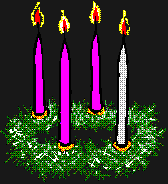Isaiah,
Chapter 11, verse 2-3:
2 The spirit of
the LORD shall rest upon him: a spirit
of wisdom and of understanding, A spirit of counsel and of strength, a spirit
of knowledge and of fear of the LORD, 3 and his delight
shall be the fear of the LORD.
In Jeremiah 1:8 the Lord called the prophet and if
we accept the call like him we will be empowered or prepared for our work from
on high with wisdom and understanding and fear of the Lord. In fact the Church has traditionally
enumerated seven gifts of the spirit: wisdom, understanding, knowledge,
counsel, fortitude, piety and fear of the Lord.
Fear of the Lord enamors the soul with an intense respect for the Church
and the commandments of God. This
reverence frees the soul and lightens a person’s worldly fears and concerns. This is what happens to the happy soul that accepts
the “Yoke” of Christ. 29"Take My yoke upon you and learn from Me, for I am gentle and
humble in heart, and YOU WILL FIND REST FOR YOUR SOULS. 30"For My yoke is easy and My burden is light." (Matthew
11:29-30)
It is essential that we pass through worldly fear
to grow to Godly fear; getting to the point where we love the Lord so much we
desire to prove our love to him by keeping his commandments. 23Jesus answered and said to him, "If anyone loves Me, he will keep
My word; and My Father will love him, and We will come to him and make Our
abode with him. (John 14: 23) Saint John
Paul II wrote “Doctrine of the gifts of the Holy Spirit [is] a very useful
teaching of the spiritual life [And] when applied to the Christian soul, it
teaches us the fundamental moments in the … interior life: to understand (wisdom, knowledge, and understanding);
to decide (counsel and fortitude); to remain and grow in a
personal relationship with God, in the life of prayer and in an upright life
according to the Gospel (piety and fear of the Lord).” [1]
Behold, our Lord shall come with power; he will enlighten the eyes of his servants.
Today would be a good day to review the 10 Last things. Remembering that Advent is the time to prepare not only for Christ’s first coming, but also His second coming.
[1] Saint John Paul II, A Catechesis on the Creed: The
Spirit, Giver of Life and Love, entry of April 3, 1991.





